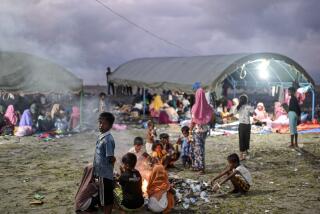Nightmare at Sea: Sole Survivor Tells of Pirate Attack
- Share via
KUALA TERENGGANU, Malaysia — Pham Ngoc Man Hung keeps to himself these days, a solitary figure in a billowing white shirt squatting in a corner of the overcrowded Marang refugee camp.
Pham, 23, left Vietnam on April 14 on a boat carrying more than 140 refugees from southern Vietnam on the now-familiar run south to Malaysia and freedom. Eventually, he said, he hopes to join an uncle in Alameda, Calif.
But two days out of Vietnam, the boat was attacked by pirates. Pham is apparently the sole survivor of one of the most gruesome incidents in the long, troubled history of the so-called boat people.
He would have perished in the choppy waters of the South China Sea had he not used the bloated corpse of a fellow passenger to keep him afloat.
People Were Warned
Earlier this month, the Vietnamese government took the unusual step of warning people that if they try to flee the country by boat they face the increasing menace of piracy and suggested that they try to make a life for themselves in Vietnam.
The warning, broadcast on Hanoi Radio, underlined a dramatic recent increase in the number of pirate attacks, mostly from Thailand, against boats carrying Vietnamese refugees. According to figures compiled by the Office of the U.N. High Commissioner for Refugees, pirates killed at least 600 people in 1988 and the first three months of this year.
Rarely has there been an attack as brutal as the one against Pham’s boat, a 66-foot motor launch.
Pham told an interviewer that he paid $1,500 to the boat’s operators, money provided by his mother, a butcher in Ho Chi Minh City. His father, a former soldier in the South Vietnamese army, is in a re-education camp, he said.
Intercepted by Pirates
According to Pham’s account, on the morning of the third day at sea the boat was intercepted by two pirate boats, the names and numbers of which had been covered over.
Seven pirates came on board, wearing black masks and armed with at least one gun and a hammer. They took a rifle from the captain of the refugee boat.
The seven pirates, who spoke to the refugees in English, told them that if they hoped to make it to Malaysia they would have to turn over their valuables. Vietnamese refugees are known to carry large amounts of cash and gold, their only resources to start life anew.
After stripping the refugees of their money and jewelry, the pirates separated the men from the women. As one of the pirates guarded the men, the others raped the women.
When they were finished, the pirates forced the refugees below deck and locked the hatch. Then they drew off the boat’s fuel and set fire to the cabin.
Managed to Escape
Pham said that when the refugees smelled the smoke they managed to break the lock and escape. But the pirates came back on board and again forced them below.
Again the refugees forced their way out and many jumped into the sea, but others, unable to swim, stayed behind and died in the fire, Pham said. The pirates attacked the swimmers, pushing them down with poles.
The attack, which began at 10 a.m., lasted until nightfall, Pham said. Pham said he managed to escape by swimming away, clinging to a piece of wood with one arm and the body of a refugee with the other.
At nightfall he encountered a young woman who had fashioned a sort of raft of three bodies. He talked with her for several hours, but by morning she had disappeared.
Pham said he pushed away from the body he had been using for support and took hold of a larger piece of timber that floated past. He drifted into a school of jellyfish, which stung his arms and made his skin feel as though it were on fire.
Rescued by Other Refugees
About 29 hours after plunging into the sea, Pham was picked up by another refugee boat and brought to Marang camp, where newly arrived refugees are housed until processed.
He said that on the morning before the attack, the captain had counted the people on board and found 109 adults and between 20 and 30 infants. None but Pham is known to have survived.
Ironically, Southeast Asian governments have announced that as of March 14 they will screen all arriving “boat people” to determine if they qualify as political refugees or will be classified as economic migrants and ineligible for resettlement.
Pham said he was not aware of the deadline when he left Vietnam but that in any case he will not go back.
“I will commit suicide,” he said. “After all, I was nearly dead once, in the water. I’d rather die than go back to Vietnam.”
More to Read
Sign up for Essential California
The most important California stories and recommendations in your inbox every morning.
You may occasionally receive promotional content from the Los Angeles Times.













